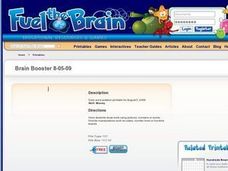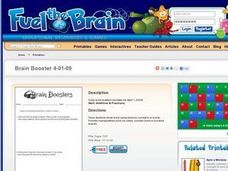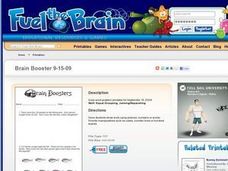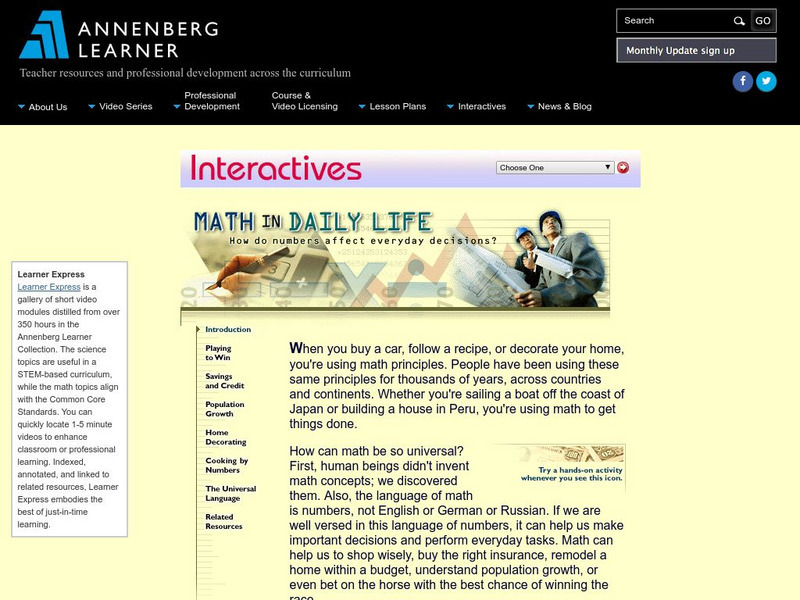Collaborative for Academic, Social, and Emotional Learning (CASEL)
Examples of Social and Emotional Learning in Elementary Mathematics Instruction
A 12-page document lists an abundance of math-related activities that boost social and emotional topics; self-awareness, self-management, social awareness, relationship skills, and responsible decision making.
Kelly's Kindergarten
August Daily Activities
You'll feel more than prepared for the start of the school year with this collection of daily activities for the month of August! From filling in numbers on a calendar or coloring patterns to solving addition and reading...
Fuel the Brain
How Much Did They Spend?
Young learners do basic addition (with numbers between 50 and 323), to solve two short word problems. This is a great activity to start the day, or consider using this as a type of summative assessment.
Curated OER
Counting by Groups of Ten, Number Line
Have your youngsters test out their abilities using a number line. Students will add to the number line by increments of ten until the solution is found!
Curated OER
Daily Math Chapter Investigations
In this problem solving skills activity, student solve a math word problems that requires them to review problem solving strategies covered in a chapter of study.
Fuel the Brain
Separating
Using simple subtraction, your class will understand how to separate information that is given for the solution.
Curated OER
Addition/Join Result Unknown; Fact Family-4
By combining amounts from two parts of the day, your students will find a total sum.
Fuel the Brain
Addition & Subtraction
Do your young learners know how to recognize a number if it is spelled out instead of being shown as numerals? They will solve two-digit and three-digit addition problems by recognizing the word and transferring that number into numerals.
Fuel the Brain
Addition & Fractions
Solve addition problems and problems involving fractions with ease! Your class will have a better grasp on these concepts after completing this 2 problem worksheet.
Fuel the Brain
Solve Problems by Making Hundreds
If your learners understand how to group in hundreds, this worksheet is a great way to practice this skill. The story problems ask how many groups of hundreds can be formed and if any are left over.
Fuel the Brain
Combine Fractions to Describe Parts of a Whole
If students don't finish their whole lunch one day, a fraction of it will remain. On a second day, if they don't finish their lunch, another fraction will remain. What is the sum of those fractions?
Curated OER
Equal Grouping, Joining/Separating
Fishing is fun because you can share what you catch. Learners test their addition skills to see how many fish are caught by each person. Another total is given, but all the fish have to be distributed equally. Hope your learners...
Fuel the Brain
Joining by Tens
Used as a warm-up or exit ticket, your class will enjoy solving problems about dinosaurs and blocks. Adding 10 to any number may be tricky, so allow your learners to use manipulatives or draw on the worksheet itself!
Curated OER
Represent Numbers, Joining, More/Less
Have your learners practice their simple addition and recognizing larger and smaller quantities with this fun and simple exercise. Counting apples is an entertaining way for them to show off their skills!
Curated OER
Lost in Translation
Students reflect on the uses of mathematics in their daily lives and work in pairs to design brochures that make specific mathematical concepts clear and interesting to a popular audience.
Annenberg Foundation
Annenberg Learner: Math in Daily Life
Read about what math has to do with cooking, chances of winning a game, even decorating your home. Teachers may want to peruse this site for ideas about real world applications in their lesson planning.
ClassFlow
Class Flow: Mtw Calendar
[Free Registration/Login Required] This flipchart is designed to be used as a calendar pocket chart commonly used for Kindergarten-2nd grade opening of the day math activities.


















